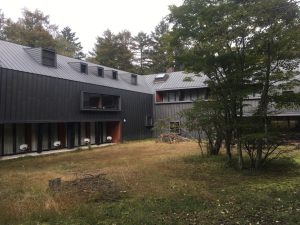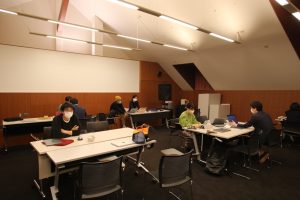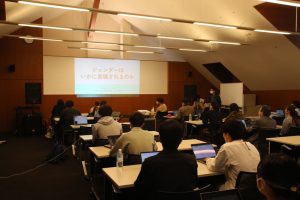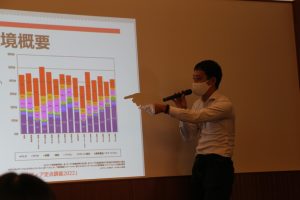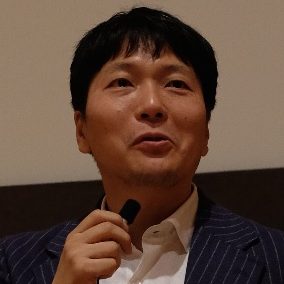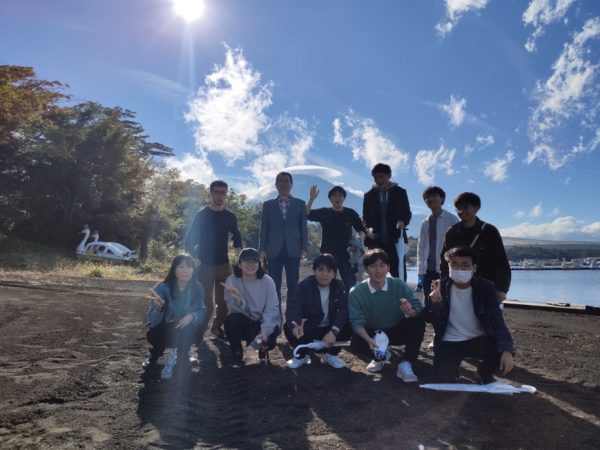
December 6, 2022
【情報学環教育部】山中湖畔での教育部合宿報告The Undergraduate Research Student Program study camp report
情報学環教育部は、10月8〜10日に合宿を開催しました。 恒例行事のはずが台風やコロナ禍による中止を経て、4年ぶりの実施となりました。30名の研究生が参加し、山中湖畔の東京大学山中寮内藤セミナーハウスで寝食を共にしました。
情報学環教育部には「特別演習」という名のもとで「自主ゼミ」が存在します。研究生自らが選んだ研究トピックに基づきグループに分かれて開催されていますが、合宿はこの自主ゼミの中間発表会であり、教育部研究生の交流の機会でもありました。今年度の自主ゼミは「ジェンダー」「政治」「ジャーナリズム」「メディア分析」「地方」「教育」「VR」という7つのテーマのゼミに分かれています。各ゼミは合宿での発表会に向けて、これまでの議論を一度収束させ、報告の準備をしました。
合宿の2日目に行われた自主ゼミ発表会は9時間に及び、多種多様で刺激的な発表がなされました。各発表後の質疑応答では、実務経験のある社会人研究生からのフィードバックや、内容を踏まえた討論が見受けられました。 以下は発表された研究トピックの一部です。
・食べログとGoogleのレビューのテクスト分析比較をもとにした考察
・記事のテクスト分析や取材を通じた、多様なアクターから見た「地方創生」の再解釈
・広告に見るジェンダー意識の変遷の分析
・VRを用いた車掌の降車禁止放送の表現方法の考察
・取材と統計分析を通じた、学生の国会議員秘書インターンの実態の考察
・鈴木健『なめらかな社会とその敵』と近代建築の読解を通じた、メタバース空間設計に関する考察
発表に集中した2日目以外は、研究生の交流の時間となりました。情報学環教育部の魅力のひとつは、なんといっても40歳差を超える研究生の層の厚さと多様性です。大学生は所属大学も東京大学内外さまざまであり、社会人もジャーナリズム、マスメディア、ICT関連をはじめいろんな業界で実務経験を積んだ人々です。この合宿での対面交流は研究生間の親睦を深め、新たな出逢いを促す機会となりました。例えば定年退職されている社会人研究生が持参したVRキットで、ある学生研究生は仮想現実を初めて経験しました。またある学生は、社会人の方に就職活動や人生相談をしていました。またある時はマイナンバー制度やプライバシーの権利について、畳上でおやつを食べながら激論が交わされたこともありました。交流の様子は教育部ならではでした。
最終日は山中湖周辺を散策する班と温泉に浸かりに行く班に分かれました。遊覧船上で富士山にかかった笠雲から差し込む光や露天風呂で温泉の湯気を浴びながら、引き続き交流を楽しみました。合宿は教育部の魅力が凝縮された行事でした。来年度の開催も強く期待します。
西本知貴(教育部研究生・東京大学教養学部文科I類2年)
The Undergraduate Research Student Program of the III held a study camp from October 8 to 10 at the Yamanaka Dormitory–Naito Seminar House of the University of Tokyo in Yamanashi Prefecture. A total of 30 students participated in this camp which was held for the first time in four years.
The Research Student Program offers a class called “Special Seminar,” in which independent seminars consisting only of research students are held based on topics chosen by the students. The camp was a mid-term presentation of these seminars and an opportunity for exchange among the students. This year’s independent seminars have seven different themes: “Gender,” “Politics,” “Journalism,” “Media Analysis,” “Local Regions,” “Education,” and “VR”. Each seminar prepared a report on their discussions to date and presented it at the camp.
The presentations held on the second day of the camp lasted for 9 hours and featured a wide variety of stimulating presentations. During the question-and-answer sessions following each presentation, feedback was given by older students with practical work experience, and intense debates took place. The following is a partial list of the topics presented:
• Comparative textual analyses of Tabelog and Google food reviews
• Reinterpretation of “regional revitalization” through textual analysis of articles and interviews
• Analysis of changes in gender consciousness in advertisements
• A study on train announcements prohibiting passengers from getting off the vehicle
• A journalistic and statistical study on student interns as secretaries to Diet members
• A study on Metaverse space design combining Ken Suzuki’s Nameraka na Shakai to sono Teki (“なめらかな社会とその敵”) and modern architecture
The three days were not spent merely on the presentations ––students had plenty of time to socialize.
One of the most attractive features of the III’s Research Student Program is the diversity of its student body, spanning over 40 years in age difference. Undergraduate students consist not only of UTokyo undergraduates but also of students from other universities. There are also students who have gained professional experience and are currently engaged in journalism, mass media, ICT and other media-related industries.
The face-to-face interactions at the camp provided an opportunity to deepen the friendship among the research students and to encourage new encounters. For example, one student researcher experienced virtual reality for the first time with a VR kit brought by a retired research student; a sophomore asked another working mature student for advice on future careers; another time, students engaged in a heated discussion about the My Number system and privacy rights over snacks.
On the final day, students divided into two groups, one for a walk around Lake Yamanakako and the other for a soak in a hot spring. The camp was truly an event that encapsulated the unique Research Student Program experience.
Text: Kazuki Nishimoto (Undegraduate Research Student, The University of Tokyo)
主担当教員Associated Faculty Members
准教授
上條 俊介
- 先端表現情報学コース
- 情報学環教育部
Associate Professor
KAMIJO, Shunsuke
- Emerging design and informatics course
- Undergraduate research student program


